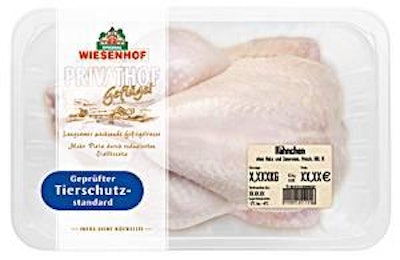
October saw Germany’s Wiesenhof launch the Wiesenhof-Privathof on its home market, offering poultry raised to higher welfare standards, the company notes.
The rearing methods behind the brand were developed through discussions with welfare and academic groups, and the brand responds to a growing desire among German consumers to ensure that their purchasing habits support animal welfare.
The largest division within the PHW Group, in the 1960s, Wiesenhof was the first company to bring branded chicken to the market. In 1995, it established the first origin guarantees for its poultry products and stopped using meat and bone meal in its poultry feed long before concerns began to emerge about its inclusion in feed. Now, almost every second chicken sold in Germany is a Wiesenhof bird, and since 2002, along with its standard birds, turkeys and ducks, the company has been producing organic birds. This latest initiative, however, is firmly focused on bird welfare.
For its Wiesenhof-Privathof brand, the company uses the slower-growing breed Cobb Sasso, developed for free-range, organic and other higher welfare systems.
Cobb Germany director, James Truscott, commented: “Privathof is setting a new standard in Germany just as the Freedom Food brand in England is very successful. It requires poultry to be grown slower, have more space and live in a more varied environment. Wiesenhof-Privathof is the latest product from Germany’s leading poultry brand catering for consumers looking for chickens reared using alternative production methods.”
The regime to be followed to rear higher welfare birds was developed through discussions between the company’s own researchers, the Institute of Animal Welfare, Animal Husbandry and Animal Hygiene, Ludwig-Maximillian University, Munich, and the German Welfare Federation, Deutscher Tierschutzbund.
Partnering with the German Welfare Association was a logical step given that in June 2011, it had announced its intention to introduce an animal welfare label for products of animal origin, which indicates standards being followed well beyond the legal minimum. The federation said that the label would be developed for all farmed animals, covering the entire production chain from breeding to slaughter, and that it would start with standards for pigs and poultry.
For its Privathof brand, Wiesenhof decided that not only would it opt for a slower growing breed, but that stocking densities would be lower than in traditional rearing and that birds would have access to a covered outdoor space. Within the houses, straw bales would be made available, along with litter to allow birds to scratch.
Evaluation
As part of a long-term study, cameras were installed in barns to document and evaluate birds’ behavior. It was concluded that the facilities made available to them allowed an expression of natural behavior and resulted in behavior improvement.
But how is bird welfare really measured? Professor Michael Erhard, director of the Department of Animal Welfare at the Ludwig-Maximillian University, noted that while it was difficult to measure animal welfare as the birds cannot be asked, there are certain measures that can be applied, including looking at what animals do in the barn, and what their preferences are when certain elements are changed. Another parameter is the health of the birds.
He continued that opting for a slow-growing bird allowed better skeletal and muscle growth and that lower stocking densities allowed greater movement and fuller expression of natural behaviours.
Placing cameras within the barns had allowed the recording of how birds move, which resources they use and how much they rest. This allowed researchers to know exactly what was going on and to measure certain parameters objectively.
The Privathof brand is currently distributed in the south of Germany through three supermarket chains and will be extended into the north of the country as supply increases. As a first step, whole chickens have been launched, but the range will include breast portions and drumsticks. The product has a price point some 30% higher than traditionally raised chicken.
“We believe that this is the right time for an alternative poultry concept”, said Peter Wesjohann, chairman of the PHW Group. “Now consumers can decide how important welfare is to them.”


















